et illustration
Aurélie Verdon
Direction technique et Intégration
Mehdi Mahjoub
Conception et rédaction
Jocelyne Porcher
Photographies
Philippe Deschamps
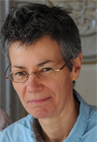
INRA, UMR Innovation, Montpellier. Sociologist. Team leader.
Jocelyne Porcher is director of research at INRA. Her research concerns work relations between humans and animals. She is the author of various books and articles on the subject of affective relations between farmers and animals, suffering at work, animal husbandry and animal production, particularly relating to the industrial pork business. Her research also concerns the contrasting changes in our relations with animals, such as “animal liberation”, food biotechnology and organic animal husbandry.
Contact: jocelyne.porcher[a]supagro.inra.fr
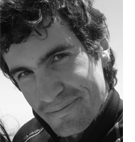
UPEC (Universite Paris-Est Créteil Val de Marne). Geographer and university lecturer in geography at UPEC.
Jean Estebanez is interested in the way that relations between humans and animals do not exist independently of the time and place where they are forged. In analysing the role of place in the construction of ties, in particular work ties, he aims to illuminate the spatial dimension of communal living with animals.
http://www.laburba.fr/estebanez-jean/
Publications:
-Géoconfluences, 2014, L’océan domestiqué: les aquariums comme dispositifs d’extension de l’Ecoumene (The domesticated ocean: the aquarium as a tool for the extension of the Ecumene) (read here).
-Carnets de Géographes, 2013, Où sont les animaux? Vers une géographie humanimale (Where are the animals? Towards a humanimal geography (read here)
–Sociétés, 2010, Ceux qui sont proches: les soigneurs au zoo (Those who are close: zoo keepers) (read here)
Contact: jean.estebanez[a]u-pec.fr
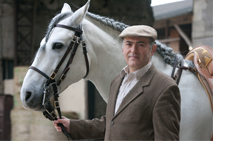
Economist, teacher-researcher in linguistics and senior horseman at the Agence Hippique Cavalgador, specialising in equestrian activities and the professional training of riding instructors in traditional Portuguese equitation.
Within the COW programme, Carlos Pereira coordinates a team of six (four riders, a designer and a graphic artist), who are interested in developing languages for “talking to” horses. Two forms of language are currently being studied: the interspecific language used during traditional horsemanship, and the interspecific language used when the horses are not being ridden. This research employs semiotic, linguistic and ethological conceptual tools.
Contact: henriquespereira[a]wanadoo.fr/http://equitationportugaise.com
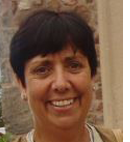
INRA Ecodev, Avignon. Eco-ethologist.
Elisabeth Lécrivain is responsible for research into eco-ethology at INRA. She studies the behaviour of farm animals as they interact with farming modalities, as well as the means of communication used by animals and humans in daily work. Her research seeks to determine the part played by the subjective implication of animals through an analysis of their cognitive competences and their relational behaviour towards their farmers.
Contact: lecriv[a]avignon.inra.fr
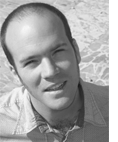
INRA Agir, Toulouse. Sociologist.
Antoine Doré is a researcher at INRA. His research concerns the management and administration of humans and animals in the fields of agriculture and the environment.
http://www6.toulouse.inra.fr/agir/Les-equipes/ODYCEE/Membres/Dore-Antoine
Contact: dore.antoine[a]yahoo.fr
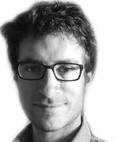
Sociologist, associate researcher at UMR Innovation (INRA/Montpellier SupAgro/ CIRAD), and member of the INSERM ethical committee.
Sébastien Mouret’s research concerns the place of morale and work in relations between humans and animals. He is a winner of the Monde de la recherche universitaire en sciences sociales award, with Élever et tuer les animaux (raising and killing animals), published by Presses Universitaires de France. This piece of research throws a light on the relationship between love and violence in work relations between farmers and farm animals.
His research also concerns the careers and skills of guide dogs for the blind and national police dogs. It examines and compares the construction of the training process for “working” dogs, from their arrival to their departure from institutions. Animal work is seen as a “system of local coordination” (Dodier 1993), resting on different qualities: the “responsibility” by which guide dogs for the blind become care workers, and the “courage” by which patrol dogs become actors in the public force.
contact: mouret_s[a]hotmail.com
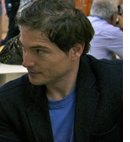
Anthropologist and doctor of ethnology. Affiliated with the Ethnology and Comparative Sociology laboratory at the Université Paris-Ouest Nanterre la Défense.
Nicolas Lainé’s research aims to measure the influence of different ecological, political, social and economic contexts on the nature of the ties and modalities of interaction within man-elephant work communities in Asia, from the perspective of a deanthropocentred anthropology. Within the framework of the “Social representations of pathogens at the frontier between species” project, he is conducting post-doctoral research into representations and treatment of tuberculosis in elephants in Laos. This research considers the emergence of this “reversed” zoonosis, where the risks are situated at the interface between wild and domestic.
contact: nicoelephant[a] gmail.com
Linda Kalof. University of Michigan (US). Sociologist (site)
Kendra Coulter. Brock University (Canada). Sociologist (site)
Rhoda Wilkie. University of Aberdeen. (UK). Sociologist (site)